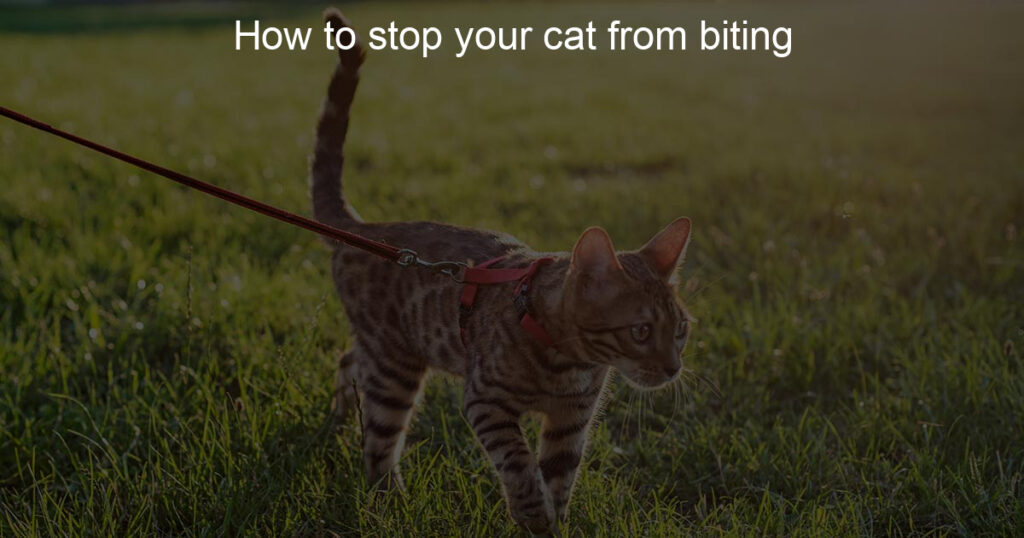Do you have a cuddly, furry friend who occasionally decides that your finger is their favorite chew toy? Or maybe your beloved feline can’t seem to resist jumping onto tables and biting at anything (or anyone) in their path? Whether you’ve had issues with aggressive cat behavior for days, months, or years: fear not!
There are lots of ways to handle pet-on-human aggression that don’t involve yelling or punishing – and help introduce your four-legged family member to more peaceful habits. In this blog post, we’ll dive into proven strategies for curbing the biting behaviors of cats so they can fit right in with other members of the household – both human and feline!
How do you discipline a cat for biting?
Managing a cat’s biting behavior requires patience and consistency, but it is possible. The first step is to identify and address the root cause. Is your cat feeling anxious or overstimulated? Are they playing too rough with their toys?
Once the underlying issues have been addressed, you may provide a firm “no” every time they bite, and reward them for more appropriate behavior like gentle petting. During playtime, keep an eye out for signs of stress so you can intervene before an episode arises. Biting is a way for cats to communicate; by taking steps to understand why your feline friend is behaving this way, you can better ensure that both of you remain safe and happy.
How should I react when my cat bites me?
When your cat bites you, it’s probably not out of malice or aggression—it’s them trying to show their affection! They do this because their instinct is to bite and groom each other (which includes biting their human pals too!).
The best way to react when they give you a love bite is to immediately remove your hand and offer up something a bit more appropriate, like stroking behind the ears or the cheeks. This teaches them that biting is not acceptable. If your cat continues to bite you, talk with an animal behaviorist who can help guide you through some gentle solutions to modify the behavior.
How do you get your kitten to stop biting you?
It’s normal for kittens to bite and scratch as they learn how to play, but those tiny teeth and claws can still be painful. To get your kitten to stop biting you, start by providing them with plenty of toys that will help engage their natural hunting instincts. Make sure you take note of when they start getting overly playful and respond with a firm “No!” in a stern voice.
Redirect their attention back to the toy before intentionally disengaging with them completely. The goal is not to punish your kitten, just give them clear boundaries so they know what is appropriate behavior. In time, congratulations! You’ll have a kitten that knows how to play nicely!
How do I train my cat not to bite?
Training a cat not to bite can be tricky, but it’s doable. The key is to provide clear cues and positive reinforcement whenever they resist the urge to bite. Start by offering them toys or other acceptable ways of scratching and biting, such as scratching posts and fibrous toys.
If your cat bites when feeling agitated, redirect its energy by providing a calming activity like playing a game with them. When they do bite, firmly say “no” and offer positive reinforcement when they listen. For example, give them treats or praise when they don’t bite. With consistent practice and patience, you’ll be able to teach your cat that biting is unacceptable behavior.
Summary: How to stop your cat from biting
While cats are naturally playful creatures, it can still be a struggle when they turn that natural playfulness into biting. However, there are some easy steps we can take to keep our cats biting and happy at the same time.
Start by engaging your cat with appropriate toys and activities to redirect their energy somewhere else and give them plenty of love and affection to create trust between you. If your cat is still feeling feisty then put them in time out or spray them lightly with water to indicate that their behavior is not acceptable.
It may take some trial and error but finding ways to stop your cat from biting will result in a happier and healthier relationship between you both. Ultimately, remember that cats are animals with needs of their own, so taking the time to understand what works for them is essential for successful training.












